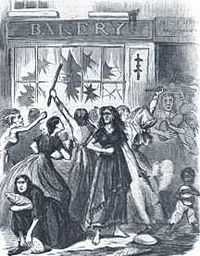Southern bread riots

The Southern bread riots were events of civil unrest in the Confederacy, perpetrated mostly by women in March and April 1863. During these riots, which occurred in cities throughout the South, women and men violently invaded and looted various shops and stores.
Causes
The riots were triggered by the women's lack of money, provisions, and food; all of which were the result of these factors:
- Foraging armies, both Union and Confederate, ravaged crops and devoured farm animals.
- Inflation created by the Confederate government was staggering.
- The drought of 1862 created a poor harvest that did not yield enough in a time when food was already scarce.
- Salt, which at the time was the only practical meat preservative, was very expensive (if available at all) because it was generally an imported item. The Union blockade prevented imports, and the capture of Avery Island, with its salt-mine, exacerbated the problem.[1]
Similarly to the French Revolution, citizens, mostly women, began to protest the exorbitant price of bread. The protesters believed a negligent government and speculators were to blame. To show their displeasure, many protesters turned to violence. In Richmond, Columbus, Georgia, Macon, Atlanta, and Augusta armed mobs attacked stores and warehouses. In North Carolina, mobs destroyed grocery and dry goods stores.[2]
It was far more profitable for plantation owners to grow cotton and tobacco instead of food. The taxes on clerks, apothecaries and teachers were a mere 2% while taxes on agricultural produce were 10%. This created obvious tensions between differing classes and robbed the farmer of his income and means of providing for his family. Because of this, food crops suffered tremendously through supply and demand.
Food riots were occurring before the arrival of Union troops because the Confederate Army was suffering the same food shortages and was taking food stocks for its own needs. Additionally, as the cost of war for the Confederate government exceeded the tax revenue, legislation was enacted that exacerbated the situation by devaluing the Confederate currency and inflating prices of goods.
Richmond bread riots
On April 2, 1863 in the Confederate capital of Richmond, Virginia, thousands of people, mostly women, broke into shops and began seizing clothing, shoes, food and even jewelry before the Militia arrived to restore order.
Jefferson Davis gave a speech and even threw the money from his pockets to the rioters, asking them to disperse, saying "You say you are hungry and have no money; here, this is all I have". The mob stayed put; only when Davis threatened to have militiamen fire on the mob did they disperse.
See also
References
- ↑ Mark Kurlansky, Salt: A World History
- ↑ The Salisbury Bread Riot
Sources
- Flagel, Thomas R., and Allers Jr., Ken (2006). The History Buff's Guide to Gettysburg. Cumberland House Publishing Inc. ISBN 1-58182-509-9.
- McPherson, James M. (1988). Battle Cry of Freedom: The Civil War Era. Ballantine Books; Random House Publishing Inc. ISBN 0-345-35942-9.
- Kurlansky, Mark. Salt: A World History.